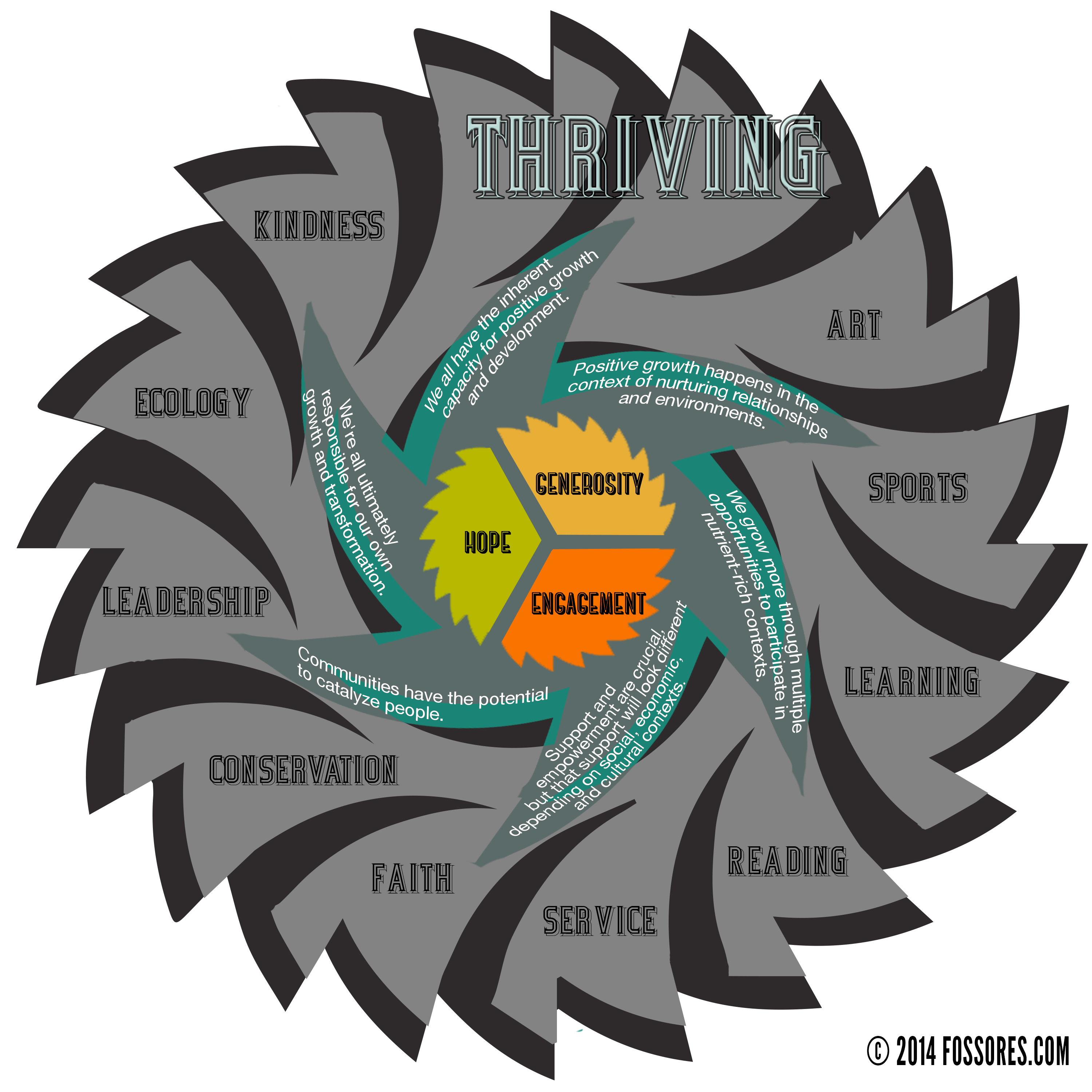“The thief comes only to steal and kill and destroy; I have come that they may have life, and have it to the full.” John 10.10
“I pray that you may enjoy good health and that all may go well with you, even as your soul is getting along well.” 3 John 1.2
“You will be enriched in every way so that you can be generous on every occasion, and through us your generosity will result in thanksgiving to God.” 2 Corinthians 9.11
I stole something at a wedding.
The wedding took place at Starr Commonwealth in Albion. I was the officiant, and moments before the ceremony began I stumbled across a fascinating article in their periodical, Reclaiming Journal. (Spring 2012, Vol. 21, 1). I looked everywhere for an additional copy, but couldn’t find one, so I ripped the article out of the magazine and stuffed it into my Bible.
(Some pastors smuggle Bibles. I smuggle contraband in my Bible.)
The article describes the top ten ways to help youth “thrive.” I’ve done plenty of youth work and “thriving” is one of the preferred terms in biblical studies to indicate God’s design for humanity.
The late Peter L. Benson, who was a psychologist and the president of Search Institute, made it his life’s goal to understand and name how a life of hope, generosity, and engagement evolves over time. I’ve reprinted some of Benson’s thoughts here but parsed them differently. Despite having zero research to back my suspicions, I do have nearly 20 years of ministry experience that gives me buckets—that’s right, sacred super-sized mind-buckets—of anecdotal evidence indicating that these things aren’t just true for teenagers.
Here’s what I found.
- We all have the inherent capacity for positive growth and development.
- Positive growth happens in the context of nurturing relationships and environments.
- We grow more through multiple opportunities to participate in nutrient-rich contexts.
- Support and empowerment are crucial, but that support will look different depending on social, economic, and cultural contexts.
- Communities have the potential to catalyze people.
- We’re all ultimately responsible for our own growth and transformation.
God intends life to be dynamic, passionate, and successful. Quite simply, he wants us to become the best possible version of ourselves and to enjoy our lives more than we’d ever dreamed possible. I think Benson’s research—if nothing else—indicates that God’s plan for our lives is totally within reach.
Your life can be better.
You can turn down the suck-knob.
But how?
Now Benson gets super-interesting. He claims there are 10 sparks that ignite personal growth and transformation. There are others, but these 10 are the ones that really get things going. They are:
- Art
- Sports
- Learning
- Reading
- Serving
- Faith
- Ecology
- Kindness
- Conservation
- Leadership
So what about the guy who’s still playing rec basketball in his thirties? Is he “wasting his time” or “chasing a dream” that’s long expired? No! And, actually, we already know this. We jokingly refer to guys like that as “living the dream.” Because they are. They’re living the dream of an abundant life, playing sports for the inherent enjoyment of athletics and competition, not to get something or somewhere else, but because sports make life better.
What about the gal who’s painting every week in a secluded, tucked-away, corner of her house? Is she keeping herself busy with a hobby? Laboring under a delusion that she’s an artist? No—she’s living the dream. She’s thriving. She’s found an outlet for creativity, self-expression, and joy that is self-perpetuating.
What about the kid who loves weird dystopian science fiction novels? Has that kid unplugged from the rest of the human race? Is he destined to become a loner? Nope. He is onto something—something worth loving—and life will always be better because of it.
We tell ourselves many of the things we love are a waste of time. But they’re not. They’re not juvenile leftovers. They’re not hobbies for has-beens. They’re not distractions from real life. They are real life. They are the means to prosperity, abundance, and delight. They’re not even luxuries, but necessities, for happiness. The problem is that we don’t prioritize them enough, so we’re not aware of how much their absence costs us.
Notice that faith comes in at a piddling number seven on the list. For what it’s worth, I’m guessing the article’s definition of faith is a lot narrower than mine. In my understanding of scripture, faith encompasses numbers 1-6 & 8-10, rather than accompanies them.
But I get why you might be suspicious of my opinion. After all, I ripped this article out of a stolen magazine in the back of a borrowed church. What do I know about faith?
Only that I now have to mail $12 to Starr Commonwealth.
fossores
Related posts
Categories
Category Cloud
Tag Cloud
Recent Posts
- Victors and Victims November 6, 2018
- 3 Hacks for Happiness October 29, 2018
- Hope Against Death September 20, 2018
- The Shape Of The Cross September 19, 2018


